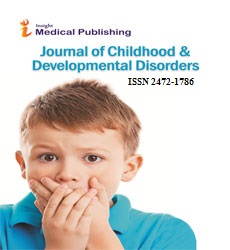Concepts In Childhood Disorder
Rapson Gomez*
Department of Life sciences Federation University, Australia
- *Corresponding Author:
- Rapson Gomez Department of Life sciences Federation University, Australia, Email: gomezrapson.fed@edu.com
Received Date: November 03, 2021; Accepted Date: November 17, 2021; Published Date: November 24, 2021
Citation: Rapson Gomez (2021) Concepts in childhood disorder. J Child Dev Disord. 7 No.11.
Introduction
Mental and formative disorders in youth have a negative impact on the mental and social well-being of children and their families. The psychological well-being of children is inextricably linked to the well-being and affluence of their parents. Despite the burden that mental health concerns place on children and adolescents, most countries do not prioritise those who are unfortunate. To achieve a considerable drop in the global prevalence and weight of youth and formative concerns, it is recommended that all nations execute and analyse nurturing abilities preparation and mother psychological well-being mediations
When a child is young, youth difficulties, also known as formative issues or learning challenges, frequently occur and are investigated. Although some adults may identify with some of the symptoms of these issues, the signs of the adolescent's distress must have appeared at some point during the individual's youth. It is common for a child to have multiple issues.
According to the United States' top health spokeswoman, over 20% of American children suffer from a diagnosable psychosocial maladjustment in any given year. Furthermore, about 5 million American children and teenagers suffer from actual psychological maladjustment (one that fundamentally meddles with their everyday life).
Bringing up children is difficult, and raising troubled children can be even more difficult. In any event, determining if your child is merely going through a phase or assuming anything is seriously wrong isn't always that straightforward.
A tantrum does not necessarily imply that your child disapproves of authority, and a kindergartener who prefers not to stand by does not necessarily have a consideration problem. When it comes to gaining a better knowledge of our children's behaviour, experts advice keeping findings and identities to a minimum.
Children with ODD will exhibit some of the following behaviours:
• being unwilling to organise or think twice about
• being effectively perplexed or quick to blow one's top
• Repeated and constant fits
• combating with kin or cohorts
• contending repetitively
• Purposefully disturbing or aggravating others
• being hesitant to arrange or think twice about
A juvenile with ODD may experience at least one of the following adverse effects, regardless of social manifestations:
• Difficulty concentrating
• Difficulty making friends
• Low self-esteem
• Persistent pessimism
Manifestations of ODD may eventually interfere with learning, making education difficult. Challenges at school may further perplex the child, setting off a cycle that could result in more signs or eruptions.
Teenagers with ODD may be able to hide their feelings more easily than younger children. Rather than exploding or exploding in wrath, they may be irritable and enraged all of the time. This could lead to wretchedness and introverted behaviours.
Many people had become aware of the link between dietary factors and youth behaviour by the 1970s. At the time, a large portion of the public believed that sugar and food additives, such as false shading and boosting, were to blame for hyperactivity. Part of the attractiveness of this idea was, without a doubt, that it provided a basic explanation of (and treatment for) conduct disorders in children. Despite this, a statistical analysis of 16 studies concluded that sugar consumption has no effect on children's social and cognitive development. Furthermore, despite the fact that food additives have been shown to increase hyperactivity in non-ADHD children, the effect is minor). Various studies, on the other hand, have found a strong link between prenatal exposure to nicotine in tobacco smoke and the development of ADHD. The progression of more significant indications of the issue is linked to maternal smoking during pregnancy.
Open Access Journals
- Aquaculture & Veterinary Science
- Chemistry & Chemical Sciences
- Clinical Sciences
- Engineering
- General Science
- Genetics & Molecular Biology
- Health Care & Nursing
- Immunology & Microbiology
- Materials Science
- Mathematics & Physics
- Medical Sciences
- Neurology & Psychiatry
- Oncology & Cancer Science
- Pharmaceutical Sciences
